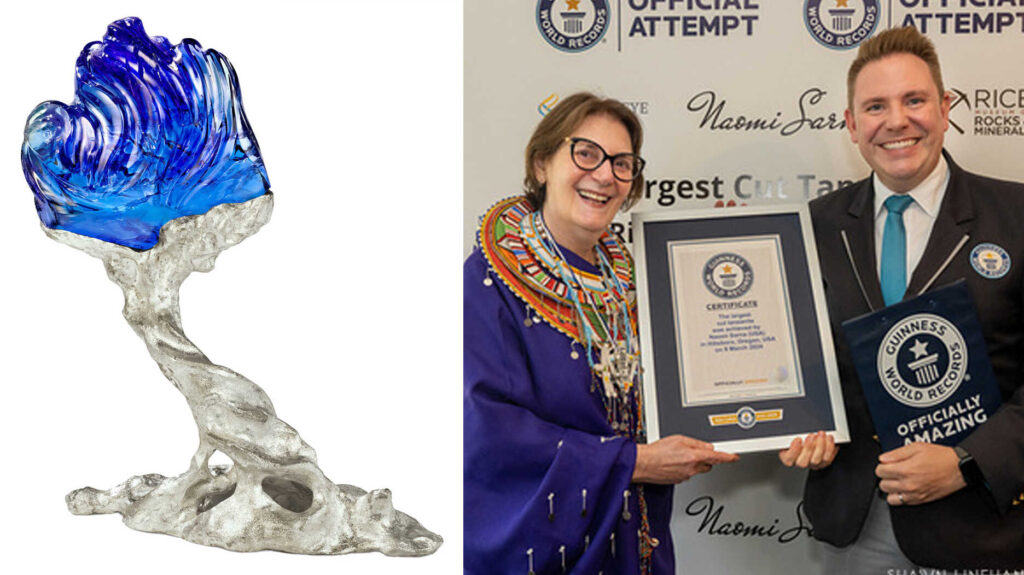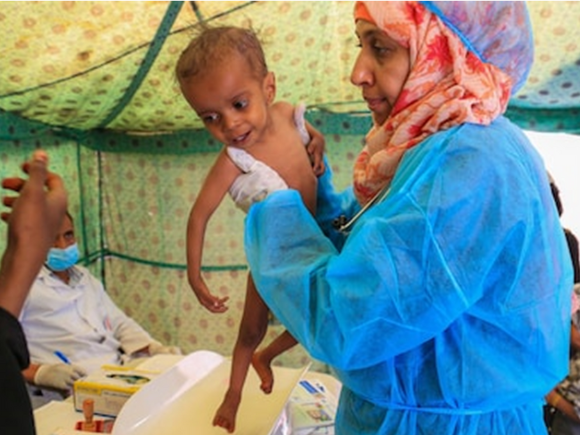Carved by Naomi Sarna, the “L’Heure Bleu” is now the world’s largest cut tanzanite.
A 703-carat blue tanzanite carving by artist Naomi Sarna has set a Guinness World Record as the world’s largest cut tanzanite.
The official weigh-in of the “L’Heure Bleu” took place on March 9 at the Rice Northwest Museum of Rocks & Minerals in Hillsboro, Oregon.
Gemstone experts, Jessie English of J.S. English Appraisals and Madeline Saunders of Oregon Estate Jewelry, were the official witnesses for the weighing, and Guinness World Records adjudicator Michael Empric verified and announced the results.
Rice Museum Board President Gail Spann and Museum Director Kim Vagner were in attendance.
“As the director of the Rice Museum of Rocks & Minerals board, and longtime supporter of this wonderful ‘gem’ in Hillsboro, I couldn’t have been more delighted that we hosted Naomi Sarna on her adventure with Guinness World Records that was enjoyed by many attendees. We are lucky to have such talent grace our museum’s doorstep,” said Spann. Related stories will be right here …
Several years ago, Sarna traveled to the foothills of Mt. Kilimanjaro—the only place in the world tanzanite is found—to select the rough from which to create the largest-ever carved tanzanite.
She was asked to create a carving for an international competition that would benefit the Maasai people, the tribe whose ancestral lands contain the tanzanite mines where a tribesman first discovered the gemstone over 50 years ago.
While in Tanzania, Sarna was presented with several tanzanite crystals and chose the piece that eventually became the L’Heure Bleu.
In 2013, it won first place in the carving category of the American Gem Trade Association’s annual Spectrum Awards.
The gemstone sits on a sterling silver base inspired by the winds of Tanzania’s Great Rift Valley.
Sarna is also involved in humanitarian work in Tanzania, which includes teaching Maasai women to make wire-wrap jewelry using tanzanite.
While in Tanzania, Sarna witnessed the effects of poverty and eye disease on the community. She plans to donate the profits from the eventual sale of the L’Heure Bleu to the Portland-based Casey Eye Institute to provide eyecare to the Maasai.
In 2017, National Jeweler reported the asking price as $500,000.
“The Guinness World Records brings international recognition and attention to my tanzanite carving L’Heure Bleu. This recognition gives great strength to my promise to help the Maasai with their vision difficulties. This is the cornerstone for our future hopes to provide eye care to the Maasai in Tanzania,” said Sarna.
Dr. Andreas Lauer, chair of the Casey Eye Institute, attended the weighing ceremony. Simultaneously, doctors from the institute were arriving in Tanzania for a cataract conference.
“The Casey Eye Institute is in Naomi’s debt. In the future, patients, their families, and the Maasai community will feel her passion and love as they express it through their smiles and joy from improved vision,” said Lauer.
For information on purchasing the L’Heure Bleu, contact Sarna directly at 917-325-2455, or visit her website.
source/content: nationaljeweler.com (headline edited)
_________

In a ceremony last month, Naomi Sarna’s carved 703-carat “L’Heure Bleu” set a Guinness World Record as the world’s largest cut tanzanite. Its sterling silver base is inspired by the winds of Tanzania’s Great Rift Valley.
___________________________________
AMERICAN / TANZANIAN STONE
